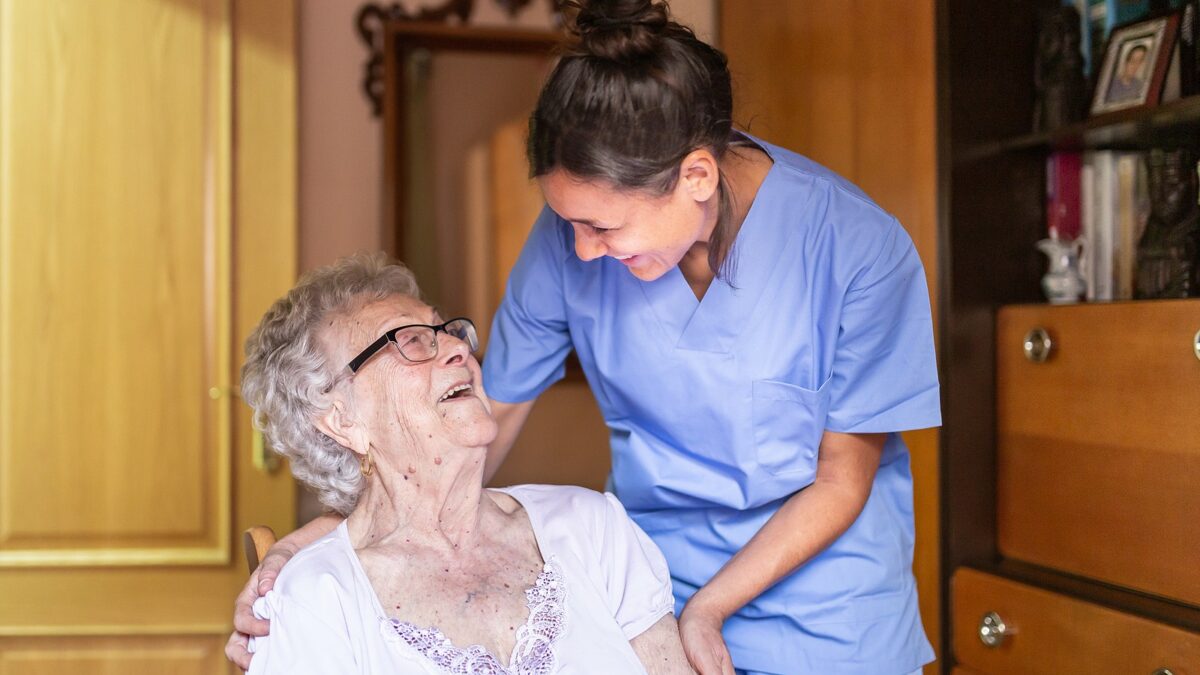The Differences Between In-Home Health Care and Home Care

If your loved one is recovering from surgery, they may require a different level of care than if they have a chronic medical condition and just need help with day-to-day activities around the house like meal prep and light housekeeping. If you’re trying to decide between home health care and home care, they may sound like the same type of service, but they are different. This blog post will examine home health vs. home care to help you make a more informed decision.
What Is Home Care?
If your loved one has a chronic medical condition that must be treated and they need help in the home, home care may be a good option. Professional caregivers can assist with everything your loved one needs — like cooking, light cleaning, doing laundry or shopping, personal care or companionship — to be safe and comfortable, excluding healthcare. Services typically include:
- Companionship — This is one of the most requested home care services for older adults. It can include attending social engagements together, playing cards, reading, listening to music, gardening, walking the dog, listening to stories, crafting and other activities. Socialization can have many health benefits, including emotional welfare, slowing memory loss and stimulating brain health.
- Medication reminders — A home care aide cannot legally administer medications (that falls under home health care), but they can remind your loved one to take their meds as prescribed and call in/pick up medication refills.
- General housekeeping — This includes cleaning the house, changing sheets and doing laundry, watering plants, taking care of pets, reorganizing closets and cabinets so they’re more accessible, and more. Regular house cleanings can also ensure your loved one’s home stays safe and sanitary, including maintenance issues.
- Grocery shopping and meal prep — This ensures there are always healthy foods and snacks available, as well as delicious, easy-to-heat meals so your loved one can have three nutritious meals a day.
- Basic hygiene — Home care aides can assist with bathing and dressing as well as styling hair, trimming and filing nails, and putting on accessories.
What Is Home Health Care?
Home health care services are typically provided after discharge from the hospital or outpatient surgery. They can help your loved one get to follow-up appointments and/or perform any of the basic recovery recommendations prescribed by their physician or surgeon. A doctor’s referral allows your family member to contract with a licensed home health care agency, who will dispatch registered nurses (RNs), licensed practical nurses (LPNs), certified nursing assistants (CNAs) and occupational, speech or physical therapists as needed. Some conditions that may require short-term home health care include:
- Heart conditions
- Strokes
- Diabetes
- Pulmonary disease
- Joint or muscular injuries
- Post-surgical conditions
Under the RN’s supervision, other members of the health care team provide medical care on a daily or multiple days per week, as needed. Depending on the care plan, your loved one’s medical care may consist of these types of care:
- Monitoring serious illness and unstable health status
- Wound care and dressing changes
- Administration of medications
- Intravenous (IV) care or nutrition therapy
- Parenteral nutrition (PN)
- Injections
- Patient and caregiver education
- At-home occupational, speech and/or physical therapy
- Medical equipment such as hospital bed, showering aids, oxygen, bedpans, etc.
- Catheter care
Because these services are medical and similar to the care provided in assisted living or a skilled nursing facility, they may be covered by Medicare, Medicaid, and/or a private health insurance carrier or long-term care insurance.
Home Health Care and Home Care Can Work Together
There are many situations in which in-home care and home health care providers work together. Someone recovering from a major health event usually needs support from both home care for everyday needs and home health care for specialized therapy to continue their recovery. For example:
Medication
- A home caregiver can help your loved one remember to take daily medications.
- A home health nurse can adjust or change medications as needed.
Physical therapy
- A physical therapist teaches your loved one therapeutic exercises to improve their health condition.
- A home caregiver can encourage your loved one to do their physical therapy exercises every day, help keep them safe, watch for problems and update the physical therapist.
Care That’s Close to Home
As faith-based, not-for-profit senior living communities, we provide a safe, secure and engaging lifestyle focused on you, including different types of home care. To learn more about all the available home health care and home care options at Friendship Village Chesterfield and Friendship Village Sunset Hills, contact us using this form.


